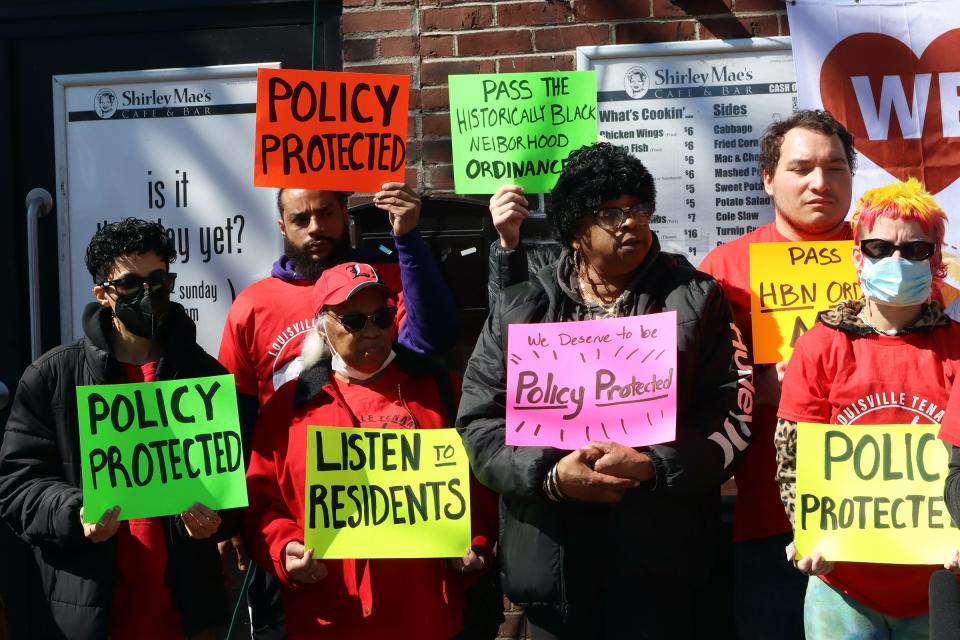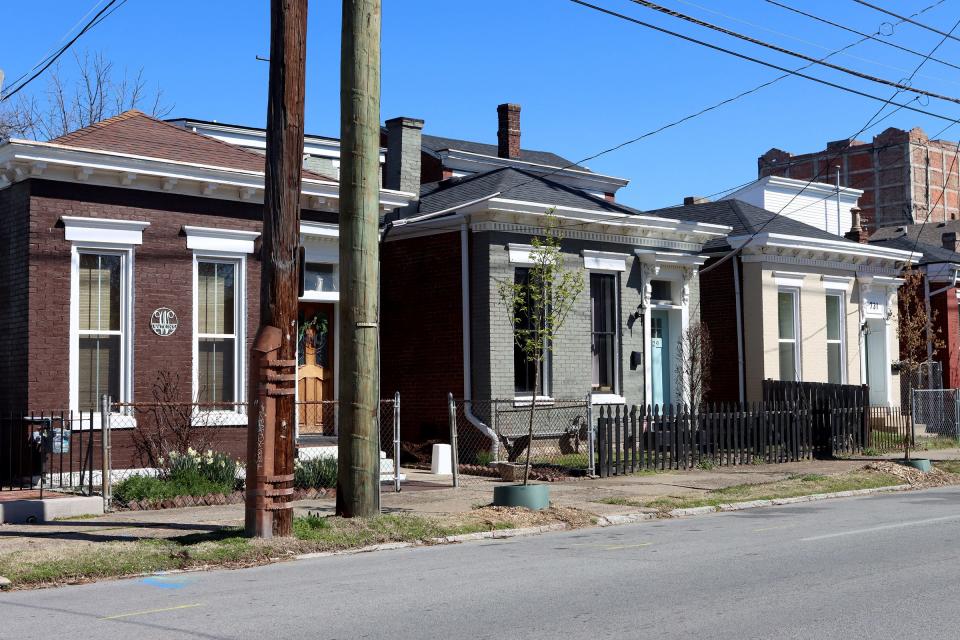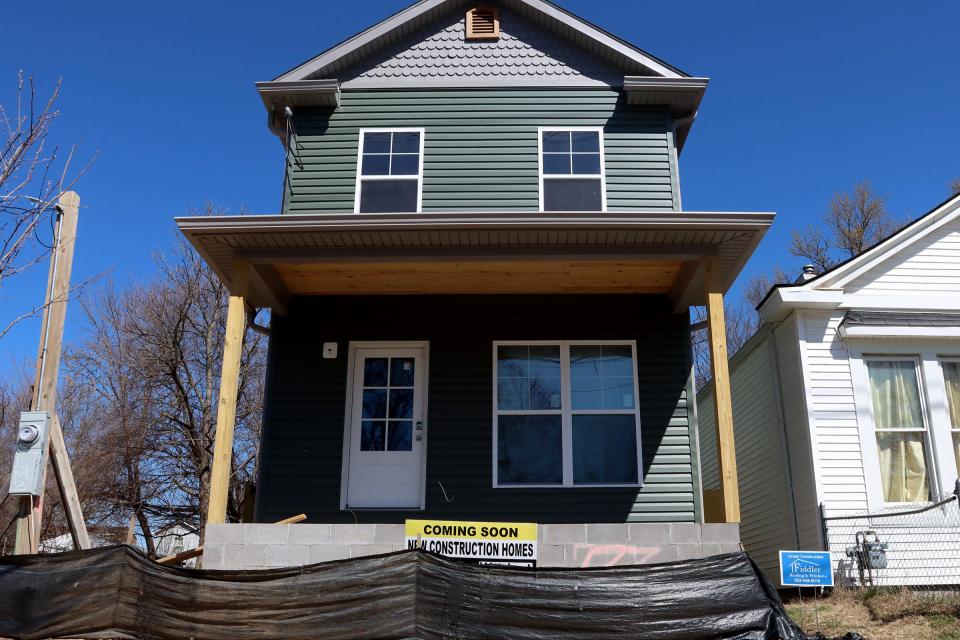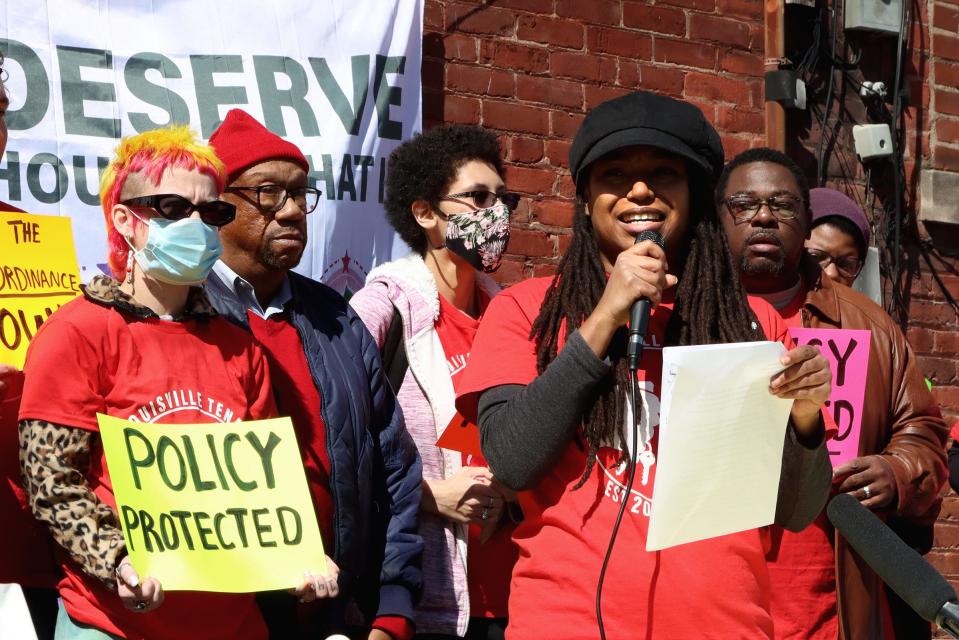'We don't deserve to be priced out': Law aims to end gentrification in Black neighborhoods

Jessica Bellamy wants to return to Smoketown.
It's the first place she remembers feeling natural, where community members not only welcomed but accepted her.
But after leaving as a child, she's struggled to move back.
Over the past decade, rent and home prices have rapidly increased alongside public and private investments in the historically Black neighborhood. Meanwhile, incomes have remained stagnant for people who've lived in Smoketown for generations, forcing them to relocate or stretch their budgets to cover rising costs.
"It's a back-and-forth cycle where people are trying to move back, but they can't," Bellamy said.
Now, Bellamy and other residents are attempting to break that cycle through a city law they crafted to curb gentrification and keep low-income people from being displaced in Smoketown and similar neighborhoods.
Related:How this historic neighborhood became the most diverse area in Louisville
Called the Historically Black Neighborhood Ordinance, the legislation would create an assessment to determine whether developments proposed in eight communities would lead to displacement. If the answer is yes, the projects would be denied Metro property, funds or resources.
The ordinance would also give residents in the eight neighborhoods priority for city assistance programs. And it would establish a "pathway to restore land that was wrongfully taken from families by the government," Bellamy said.
The overall goal is to counteract racist policies that have stripped Black neighborhoods of resources and contributed to high rates of poverty that persist today.
"Rather than ripping a family out of its community, let’s make it to where that family can stay," Bellamy said.
Metro Councilman Jecorey Arthur is sponsoring the ordinance and expects to file it for consideration soon. He's worked with residents to develop the legislation over the past two years and said it was important to take time because as the "first-of-its-kind in the country, we got to get it right."
John Washington, an organizer with the Homes Guarantee campaign from People's Action, has worked in housing policies for 10 years and said he's never seen one like what's being proposed in Louisville.
"It's a gamechanger," he said. "... I think it establishes that race and explicit race policies are important. ... This is a solution that reacts to the reality of the experience of Black people in America."
Here's what to know in advance.

How home prices in Louisville's Black neighborhoods are changing
Robert Boone grew up near Smoketown and now owns a barbershop in the neighborhood.
He's watched the area change over the years. And when he and his wife sought to buy a home there, they found there were none they could afford.
"As property taxes rise and rents go up, we lose more and more of our people who are the real legacy of Smoketown," Boone said. "... We don’t deserve to be priced out of our place where we call home."
More:Why neighbors are fighting a Louisville church over its plans to build affordable housing
Bellamy attributes Smoketown's ongoing changes to the demolition of Sheppard Square, a public housing complex that was rebuilt as mixed-income apartments between 2012 and 2016.
Louisville received a $22 million federal grant for the project and millions more in additional investments followed, including from nonprofit and for-profit developers that began flipping low-price homes.

As of 2021, the median home value in Smoketown was $182,900 – a 180% increase over the median value of $64,800 in 2010, according to U.S. Census estimates.
The median household income grew 120% over the same period, from $17,875 to $39,760, as more people with higher salaries moved in.
Similar changes are taking places in other historically Black neighborhoods, residents said, including Russell, where the Beecher Terrace housing complex is undergoing redevelopment.
More:Louisville partners with Cincinnati Bengals for new park near Beecher Terrace
A 2019 Housing Needs Assessment and the city's comprehensive plan both called for polices to prevent displacement in low-income, predominantly Black neighborhoods.
But while Louisville has taken steps to add citywide renter protections, it has not implemented an anti-displacement ordinance since the reports were released, those proposing the new legislation said.
"We are in a space right now where we are struggling to get basic needs met because of policies that are not in place to protect people, Black people," said Kish Cumi Price, president and CEO of the Louisville Urban League. "That's a problem."

How the Historically Black Neighborhood Ordinance would work
Bellamy put the call out on social media. Louisville needed an anti-displacement policy, she said. Who would do it?
Councilman Arthur had just been elected in November 2020. He said he would sponsor an ordinance, and he opened a Google document where residents, academics and others could share input on how it should be written.
"This policy is the result of residents sitting down and working things out," said Josh Poe, an organizer with the Louisville Tenants Union who produced a widely shared report on redlining in Louisville. "... They have the urgency and the expertise to actually draft policy."
You might like:Decades later and millions of dollars spent, why does Louisville's sewer odor persist?
The ordinance will have three main parts:
It will create a displacement assessment for developments in eight neighborhoods: Berrytown, California, Limerick, Little Africa (now parts of Chickasaw, Parkland and Park DuValle), Petersburg, Russell, Shawnee and Smoketown. The assessment would ask for information on rent and home prices, as well as targeted incomes for new businesses. If the developments are deemed too costly for the neighborhoods, they will not receive Metro land, money or other resources.
It will prioritize residents living in historically Black neighborhoods for city programs, such as down payment, home repair and small business assistance.
And it will create a commission to investigate whether properties were wrongfully taken from people in the neighborhoods. The commission will consist of 16 residents, along with representatives from the Louisville Human Relations Commission and other city departments, who will be tasked with determining whether someone has a proper claim to land. If the property is owned Metro government, it will be returned to them.
Shameka Parrish-Wright, director of VOCAL-KY, said the ordinance is needed to stop gentrification and help residents go "from surviving to thriving."
"We are all surviving failed policies here in Louisville, and Black communities are surviving them more than any other community," she said. "They're asking for this ordinance. We deserve this ordinance."
Reach reporter Bailey Loosemore at bloosemore@courier-journal.com, 502-582-4646 or on Twitter @bloosemore.
This article originally appeared on Louisville Courier Journal: Louisville law aims to stop gentrification in Black neighborhoods

 Yahoo Autos
Yahoo Autos 